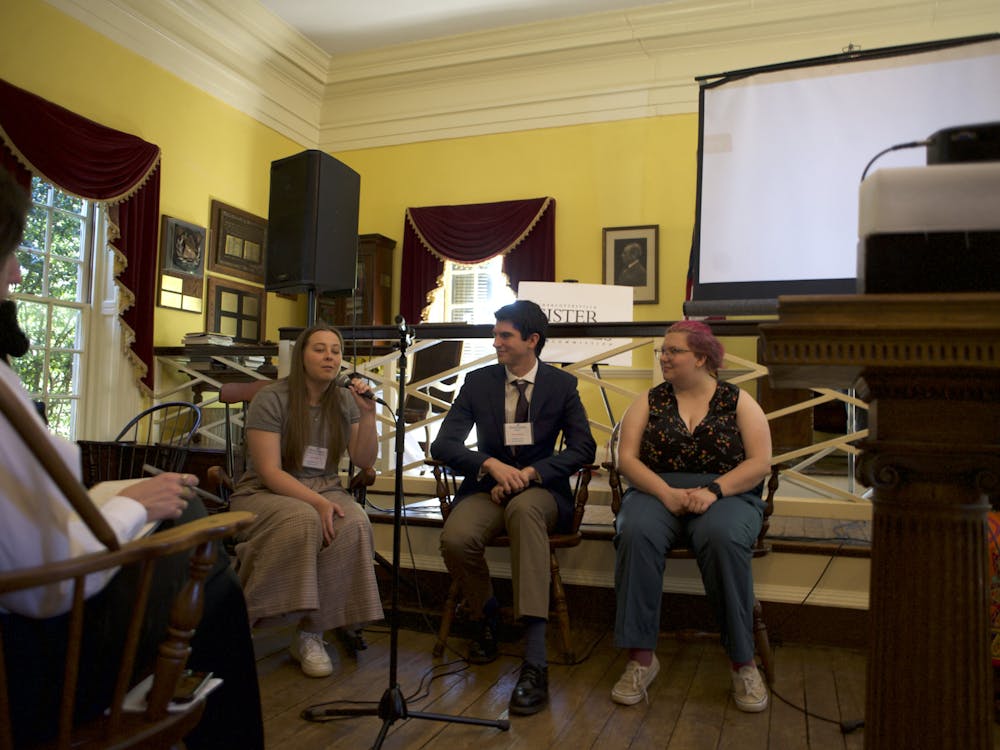中文版请点击此处
The University’s Board of Visitors discussed the University’s six-year institutional plan, improving transparency in the tuition setting process, undergraduate student advising and risk trends in two meetings held Thursday.
Audit, Compliance and Risk Committee
Committee Chair Babur Lateef, owner of Advanced Ophthalmology Inc., opened the meeting of the Audit, Compliance and Risk Committee Thursday afternoon in the Rotunda boardroom. The meeting began with an update from committee member Barbara Fried, owner of Fried Companies Inc., on the undergraduate student advising audit project.
The scope of the audit has been limited to assess the financial analysis of the cost of current programs — previously, the scope was more all-encompassing and assessed the full accuracy, completeness, availability and usage of information for students.
The advising audit task force will assess these costs and advising programs and provide updates and recommendations to Lateef and the University in order to improve the advising experience for undergraduate students.
A full report from the task force is anticipated to be completed in January 2022 and will be presented at the March 2022 Board of Visitors meeting.The Board went into further detail about this process during the Academic and Student Life Committee meeting held Friday.
Student member of the Board Sarita Mehta, a fourth-year College student, commented on advising from her perspective as a student, saying she has noticed many students are not aware of the resources the University offers or lack the time to “do the legwork” to seek out available resources.
“A lot of the services we offer and support we offer are not being used, which is, I think, a tragedy,” Mehta said. “[This assessment] is really fundamental so that we can figure out the most effective way to streamline the resources we're giving to students.”
Currently, all first-year students at the University are assigned an association dean and faculty advisor to guide in basic advising decisions such as class selection until they select their majors. Other advising resources include the Career Center, access to a college life skills coach and peer mentoring programs. The University’s Total Advising website and list of advising resources includes additional information.
The University’s Chief Audit Executive Carolyn Saint then provided a report on emerging risk trends and a summary of current Audit Department activities. Emerging risks that auditors “should have on their radars,” include cybersecurity and data governance risks, evolving COVID-19 risks and climate change risk.
Current audits in process by the department include the cash deficit management process audit and an audit of the hospital expansion project.
Finance Committee
During the Finance Committee meeting from 3:30 to 4:45 p.m. Thursday, the committee presented and approved the University’s six-year institutional plan, which is required by the state of Virginia to address the institution’s academic, financial and enrollment plans. It also includes strategies to advance the objectives of the Higher Education Opportunity Act, which is “designed to strengthen the educational resources of colleges and universities and to provide financial assistance for students in post-secondary education.”
The University's academic division plan outlines seven key initiatives, all of which are already in place. These include SuccessU.Va., a program aimed at expanding the financial aid program to enable more low and middle-income students to attend the University, and Citizen-Leaders for the 21st Century, which strives to prepare students to be “productive servant-leaders in a diverse, globally connected world.” Plans for the Citizen Leaders for the 21st Century initiative include investigating requirements for second years to live on Grounds, a goal University President Jim Ryan has outlined before.
Other initiatives include the Third-Century Faculty Initiative, the Pathways to Research Preeminence, Bachelor's Completion and Certificate Programs, Open Grounds at Emmet-Ivy and Broadening Our Horizons.
The financial impacts of COVID-19 on the University were also addressed in the six-year plan. The University reported unrecovered expenses of over $38 million in fiscal year 2021-2022 and additional lost auxiliary revenues amounting to nearly $35 million in 2021 and more than $27 million in 2022.
The plan outlines an in-state tuition of $17,263 for the 2022-2023 academic year, a 4.5 percent increase from the previous cost of $16,520. For the 2023-2024 academic year, in-state tuition is predicted to increase again to $17,868, or a 3.5 percent increase from 2022-2023.
This planned increase comes after the Board voted to freeze tuition for most undergraduate students for the 2021-2022 school year. Students advocated heavily for this freeze, including members of Student Council and Young Democratic Socialists at U.Va., who campaigned in November 2020.
An update to the budget for the Contemplative Sciences Building, first announced in December, was also given — the building’s budget has increased by $9 million from a previous $60 million. The revised financing plan calls for the project to be funded by $49 million in gifts, $15 million in bond proceeds and $5 million in cash. The building will provide a home for the Contemplative Sciences Center, and construction is expected to be completed in summer of 2023.
The committee also reviewed state biennial budget requests, which included increasing the minimum wage for students engaged in the University's work study program from $7.25 and funding to cover the University’s unreimbursed costs incurred by the pandemic.
Finally, the Board’s subcommittee on tuition presented recommendations for increased transparency and predictability in the University’s tuition setting process. Goals include enhancing contextual information provided to inform tuition setting, a revised guaranteed tuition plan for in-state students and assessing how changes to tuition and fees are communicated to students and families.
The subcommittee recommended that the Board of Visitors set tuition and fees by December in order to provide students and family with accurate information before making their admissions decisions.





